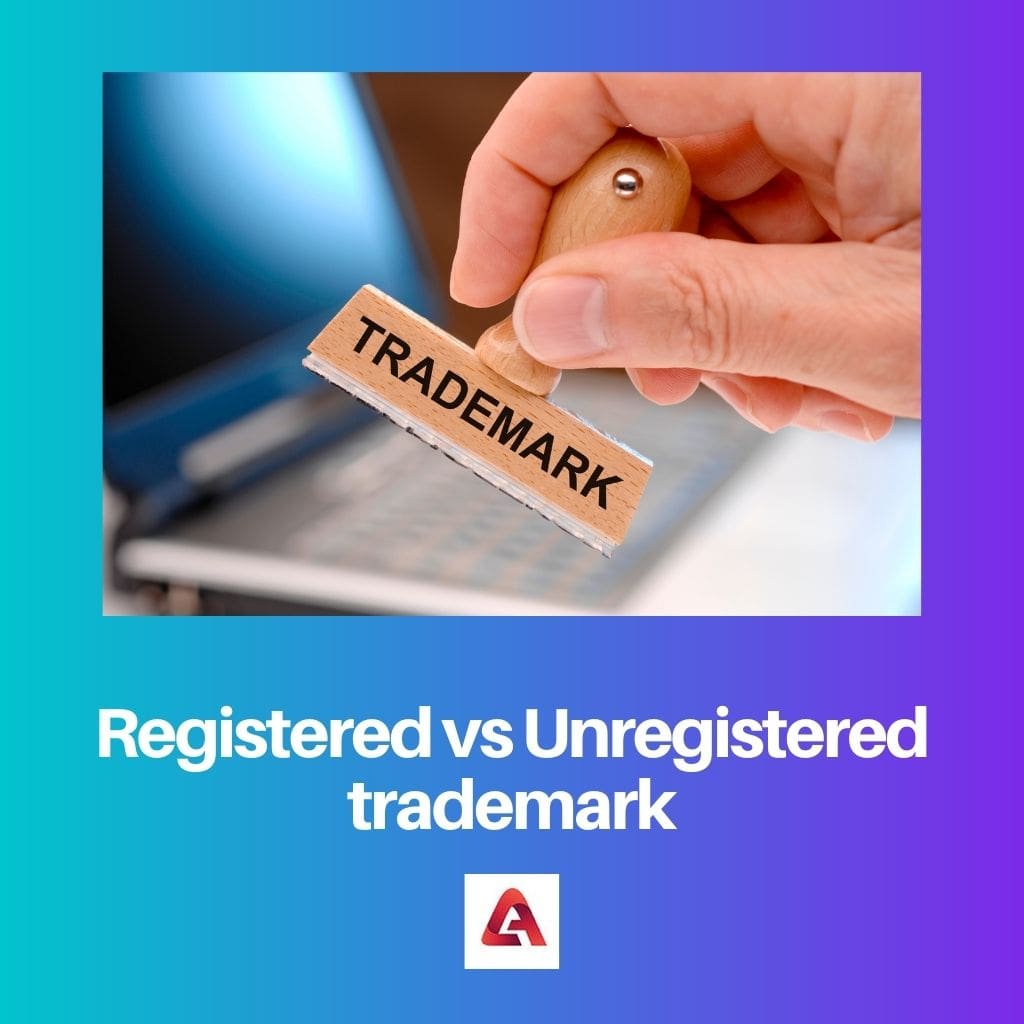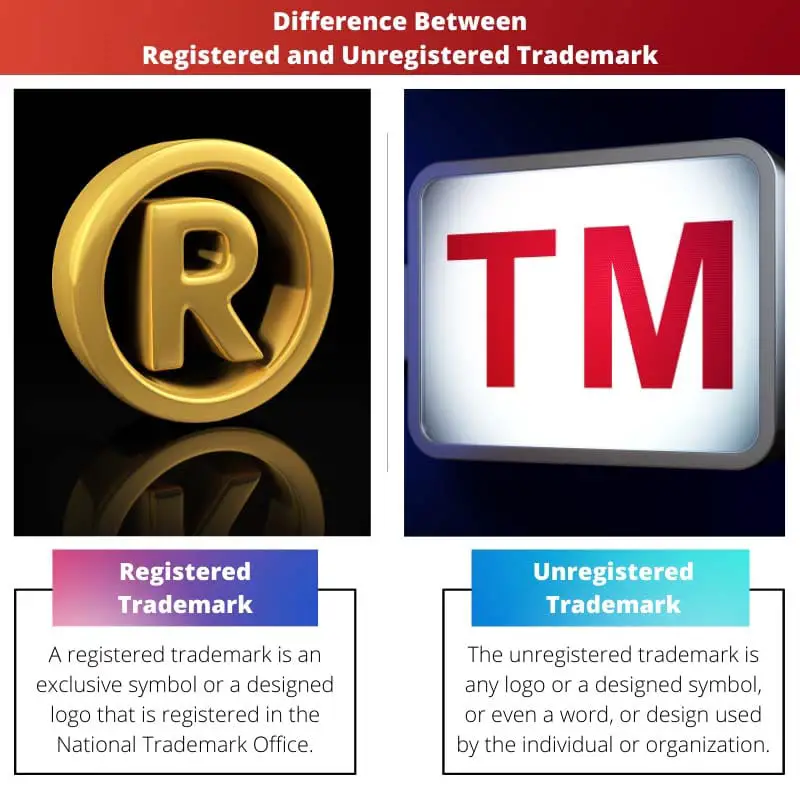A trademark is a logo, name, signature, design, label, numerals, and so on used by individuals or organizations to identify and distinguish the product from others. It is a unique identification code for the product.
The trademark is used to identify its product from other products and make a name in the market like Cadbury’s or Coca-cola. Others certainly cannot copy these trademarks; if anyone does, it is illegal.
Key Takeaways
- Legal protection: Registered trademarks benefit from enhanced legal protection, while unregistered trademarks have limited rights under common law.
- Symbol: Registered trademarks use the ® symbol, whereas unregistered trademarks use the ™ symbol.
- Geographic scope: Registered trademarks offer protection in specific jurisdictions where registered, while unregistered trademarks may have narrower regional rights based on use and reputation.
Registered vs Unregistered Trademark
The difference between the Registered and Unregistered trademark is that the Registered trademark provides security to their trademark, and no one can copy it as it is illegal. Whereas the Unregistered trademark has no guarantee of security to an individual or an organization as a registered trademark does.

A trademark is a special symbol or logo registered in the National Trademark Office by individuals or organizations for their business products.
Registering the trademarks gives the benefits and rights for ten years and can be extended if needed.
The unregistered trademark is any logo, symbol, word, or design used by the individual or an organization on a business product to identify the produced by them. It does not give the security to owners of an organization as a registered trademark does.
Comparison Table
| Parameter of Comparison | Registered trademark | Unregistered trademark |
|---|---|---|
| Meaning | It is a specific symbol, logo, design, word or colour used by the organization as a trademark and registered under the trademark act 1999 | It is a symbol, logo, design, word or colour used by the organization as a trademark not registered under any acts. |
| Security | It provides security to its owners, and being copied by others is illegal | There is no guarantee of security to its owners, and the organization’s goodwill proves it. |
| Location | The protection available all over places in the country | The goodwill has to prove where and all it earned by the owner |
| Time | The ten years of validity will be there and, if required, can be renewed | The owner has to prove the goodwill exits for the length of time |
| Policy | The rules and laws are laid by the trademark act of 1999 | It follows the rules and guidance of common law. |
What is Registered Trademark?
A registered trademark is an exclusive symbol or a designed logo registered in the National Trademark Office. Companies or individuals do it to have a secured brand figure under their name.
By registering the trademarks, it gives the benefits and rights for ten years period.
The registered trademark gives security to its owners. The branding or name makes its presence in the market for business products.
The registered trademarks cannot be copied by anyone, and it is illegal to do so. If the product owner wants his product to be branded or make an image in the market, then it is advisable to register the trademark.
The following reasons are mentioned below for the registration of a trademark are
- To identify where the product and service are produced or made.
- To advertise and branding of the products and services
- To provide security to it is owners of trade goodwill
- To protect the public from purchasing duplicate products with the same name
A trademark registration gives the monopoly right to the particular organization or its owners. It clarifies the doubt of consumers as to where the product came from.
By looking at the symbol, we can determine whether the trademark is registered or unregistered. The registered trademark shall create goodwill for every new business of any individual or organization.
The symbol of the registered trademark is ®. It will be there on the product where the business trademark is registered, and all the associations of products, once the trademark is registered or issued, owner’s responsibility to use it properly.

What is Unregistered Trademark?
An unregistered trademark is any logo, a designed symbol, or even a word or design used by the individual or organization on a business product to identify them. It does not offer any security.
The owner has to prove that goodwill exists and is earned all over the place in case he wants to produce the product and services for a long time. The trademark is not registered under any act or law, so the risk of security is high.
It does not get any legal benefits a registered trademark brings, but sometimes expected law benefits may be provided.
If any law or agreement is breached, then action can be taken for the unregistered trademark, but the common law can still protect it.
By using the common law, the unregistered trademark owner can prevent his mark from being used by others. The common law can protect the unregistered trademark on the state level.
The symbol of the unregistered trademark is “TM”. The common law gives the protection of false advertisement, origin, and false designation for an unregistered trademark.
If the trademark is not registered, the owner has the legal authority only in the place where he does the business.
If another company uses the trademark, even if it is a big company, the owner has the right to stop the usage by using the goodwill earned by that location or mark.
Even though the owner has limited power, the individual can protect their trademark by sending them a letter or asking them to stop using without a trademark license in case of a breach of the agreement.
Main Differences Between Registered And Unregistered Trademarks
- The main difference between Registered and Unregistered trademarks is that a registered trademark can support the business owner with its security over the branding. In contrast, an unregistered trademark does not have that security feature. Copying other trademarks for business purposes is illegal.
- The registered trademark comes under the trademark act of 1999. At the same time, the unregistered trademark does not come under any act or law.
- Protection is available everywhere in the country for registered trademarks, but an unregistered trademark can be supported only by goodwill.
- The registered trademark has ten years of validity, and if required, it can be renewed. While in the unregistered trademark, the owner has to prove the goodwill for the time.
- A registered trademark’s breach of conspiracy can be dealt with directly through the trademark act of 1999, while an unregistered trademark can be supported by the common law that to a smaller extent.

This article presents clear and concise information about trademarks. It makes an important topic very accessible.
This article offers comprehensive insights into the world of trademarks and the importance of registration.
Informative and well-researched.
This is exactly the kind of information needed for anyone dealing with trademarks.
The clear distinction between registered and unregistered trademarks is extremely helpful for business owners.
I found this to be a compelling and informative read.
Well done article.
The comparison table provides an excellent breakdown of registered vs. unregistered trademarks. A must-read for anyone in business.
I couldn’t agree more.
Informative and well-written article.
This is a very informative article. Now I understand the difference between registered and unregistered trademarks and the benefits of having a registered trademark.
I agree, this is a great article.
I found this to be quite enlightening. It’s crucial knowledge for business owners.
The legal protection offered by registered trademarks is vital for businesses. This article really highlights the necessity of having a registered trademark.
I found this article highly educational.
Absolutely, the security provided by registered trademarks is unparalleled.
I am very impressed with the quality and depth of information presented in this article.
This article serves as a valuable resource for understanding the significance of registered trademarks.
Absolutely, it’s an essential topic for business owners.
I appreciate the thorough explanation of the benefits of a registered trademark. Very insightful.
The article does a great job of emphasizing the importance of trademark registration.
I found this to be a fascinating read.
The article effectively communicates the importance of trademark registration.
Indeed, a very well-written article.
I couldn’t have put it better myself.